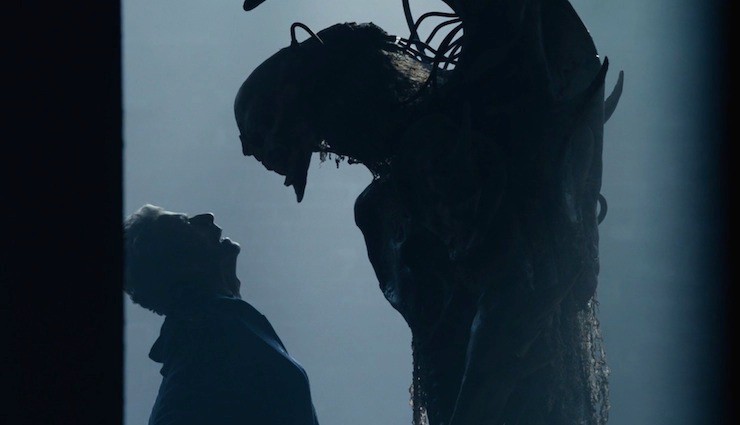What happens when the Doctor goes back in time to solve mysteries in the future? “Before the Flood” delivers on the mysteries of “Under the Lake” with a fascinating episode that takes place in our past, and a good century-and-a-half later.
Summary
The Doctor begins by explaining the bootstrap paradox to us: Let’s say a time traveler goes back to meet Beethoven, and finds that the man never really existed. The time traveler decides to take out their sheet music, copy it out by hand, and publish the works so that the universe isn’t robbed of the music. But the question becomes—where did Beethoven’s music truly come from?
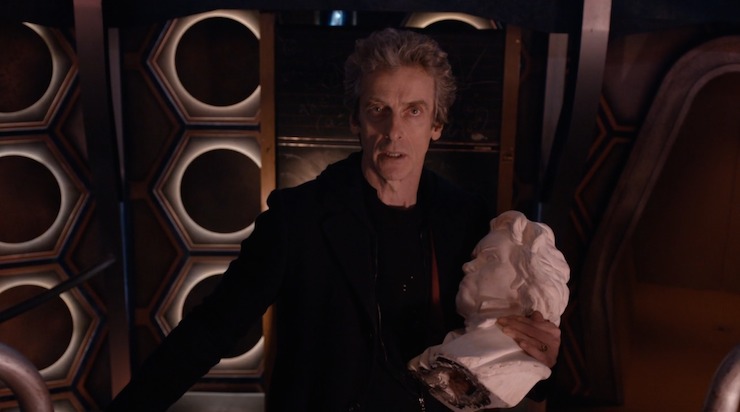
The Doctor arrives with Bennett and O’Donnell in 1980, in the town before it was flooded. It turns out to be an army base where they were doing simulations during the Cold War. They encounter the spaceship and the Tivolian who will later become a ghost—his name is Prentis and he’s an undertaker, carrying the dead Fisher King, a conquerer who controlled his people for some time. (In “The God Complex” we learned the the Tivoli hate conflict so much, they allow anyone to conquer them.) In the future, Cass realizes that the ghost of the Doctor is not saying the same words as the other ghosts; he reciting all of their names in a specific order. The Doctor calls Clara and she tells him about his own ghost, frightening the Doctor. He insists that this is the end, but Clara tells him that he has to change the future to her. He comes to terms with the fact that he will have to die to keep everything moving, and tells Clara and the others to head to the Faraday cage to stay safe. Though he asks he to keep the phone outside (it can’t receive signal in the cage), so she can see if he’s trying to contact her.
Before continuing on, the Doctor tries to get O’Donnell to stay behind on the TARDIS, but she refuses. He and O’Donnell and Bennett find that the Fisher King is alive; he has killed Prentis and engraved the key words on the wall of the spaceship. The trio run from him, but O’Donnell separates herself off and dies. Bennett confronts him about this; the Doctor had figured out that O’Donnell was next because she was next on the list of names his ghost was uttering. The name after O’Donnell’s on the list is Clara, and the Doctor decides that he will try and alter this fixed timeline for Clara’s sake… but the TARDIS just drops them back off at the base at the exact time they arrived. He is unable to leave this point in time. O’Donnell’s ghost appears in the future and takes Clara’s phone away. She realizes that the reason why the ghosts didn’t kill Lunn previously was because Cass never let him go into the spaceship—he didn’t see the coordinates written on the wall, so they’re not stuck in his head, making him a useless ghost as he can’t broadcast the signal. She tells him that he has to go get the phone, a suggestion that appalls Cass. Lunn goes for it anyway, but it turns out to be a trap, and he gets locked in the rec room on the ship. Cass and Clara leave the cage to find him.
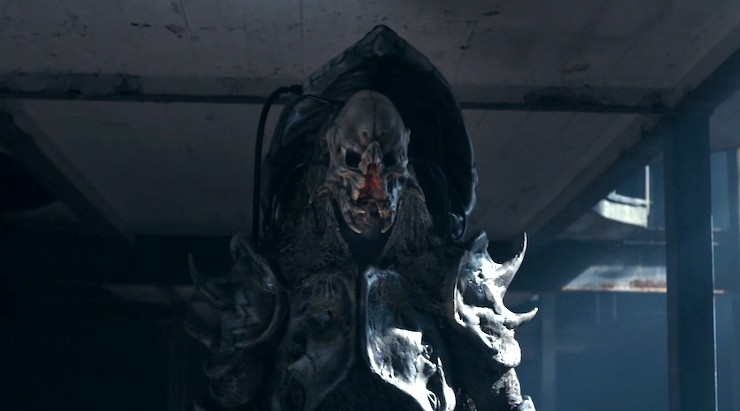
The Doctor decides to confront the Fisher King (after getting Bennett to hide on the TARDIS), in hopes of saving Clara. The Fisher King tells the Doctor that the ghost will eventually multiply and send a signal to his people, that results in an armada on Earth’s doorstep. When the Doctor tries to tell him that Earth is under his protection, the Fisher King is undaunted; he talks of the cowardice of Time Lords, unwilling to change time to suit their own ends until their entry into the Time War. The Doctor tells him that he is worse—though he may alter time, the Fisher King is playing with life and death by using the souls of these people to send his message. He lies and tells the Fisher King that he has erased his writing from the wall of the ship. When the King goes to check on it, he realizes the trick; the missing power cell from the ship (noted in the previous episode) was stolen by the Doctor and is used to blow the dam, killing the Fisher King in the flood. A TARDIS security protocol activates, sending Bennett back to the station in the future.
Cass and Clara get separated, and Moran’s ghost nearly kills Cass, but she discovers him by feeling out a vibration in the floor from the ax he is dragging. She and Clara regroup and locate Lunn in the base hangar. The status chamber opens, and the Doctor clambers out. It turns out that his “ghost” (all the ghosts are electromagnetic creations) was merely a hologram that he controlled via the sonic sunglasses. The other ghosts follow his own into the Faraday cage and are sealed in. The Doctor tells UNIT to cut out the Faraday cage and put it in space. Bennett, seeing O’Donnell’s ghost in the cage, tells Lunn to admit that he loves Cass, now understanding that life is too short. After leaving the base behind, the Doctor explains that his “list of the dead” given by his ghost was made up, and that he put Clara’s name after O’Donnell’s to spur himself into action. When Clara asks how he knew what to say as a ghost, he tells her that he knew because she told him what his ghost was saying in the future—creating a bootstrap paradox.
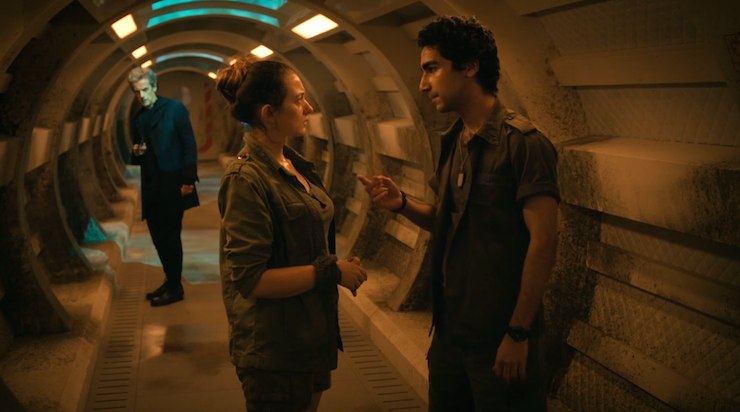
Commentary
I’ll start with the bad, since there’s not much of it; this is a very busy plot that takes a certain amount of mental gymnastics to power through. It’s a complicated mystery, and while I don’t think that’s a bad thing in television (most mysteries on TV could use a little extra thought), it’s not something that we’re accustomed to in the medium. In fact, I’d argue that it probably plays better when you watch the first part directly before it. In addition, the love stories between members of the crew (O’Donnell and Bennett, Cass and Lunn) feel a bit tacked on, as we saw very little chemistry in the first episode, mostly due to the constant peril therein. I can’t say I’m sad over it, however, as the eventual admission from Lunn that he loves Cass was a beautiful piece of the story, played to perfection by Zaqi Ismail and Sophie Stone.
Outside of that, there’s so much to praise in this episode. Though it breaks from the traditional narrative scheme, I thought that the choice to start the episode with the Doctor explaining the bootstrap paradox to us, the viewer, was inspired. I probably enjoyed it moreso because it’s one of my personal favorite time travel paradoxes, and one that the show doesn’t really engage with that often, particularly not by name. Getting more electric guitar from Peter Capaldi is always a plus—that’s him playing during the theme as well, which has got to be a first for any Doctor. (Did you notice that the amp he plugs into reads “Magpie,” the very same purveyor of televisions in “The Idiot’s Lantern”?)
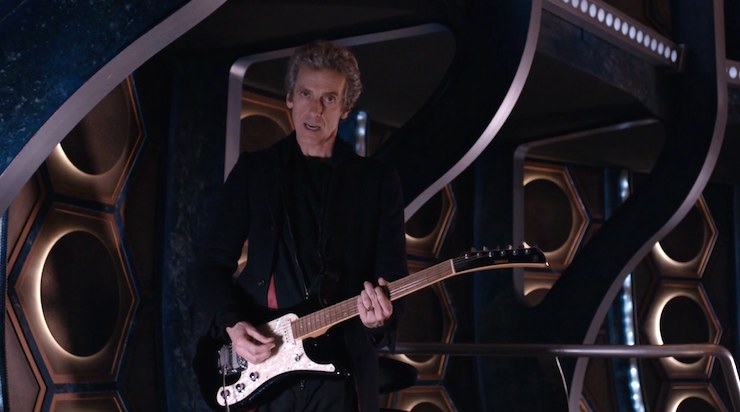
O’Donnell is adorable (even if her death was weak on logic—she just sort of veers off in the wrong direction and gets stabbed?) throughout her part in the episode, from her aside over the TARDIS’ interior to her encyclopedic knowledge of the important Doctor-related events of the past. She would have made an excellent companion—it’s probably fandom blasphemy at this point, but I’d say I prefer her to Osgood. As her mention of “the War Minister” is the one thing in her list that neither we nor the Doctor have heard of, it’s pretty certain that the season finale will involve that mysterious figure. It’s a smart tease in that it’s pointed, but not drawn out or oversold.
Having seen the Tivoli twice now on Who, I’d really love to have a episode centered around their species; their mode of survival is such a stark juxtaposition to the Doctor’s way of life. The Fisher King was also an intriguing villain, properly ominous, with enough left unsaid that his people could be expanded upon in the future. What made him more frightening was his extensive knowledge; we never find out how he knew that the Doctor was a Time Lord, or why he knows so much about the Doctor’s people in general, but everything he said about them was true. Also, he looked terrifying. Probably the scariest character design we’ve had since the Silents.
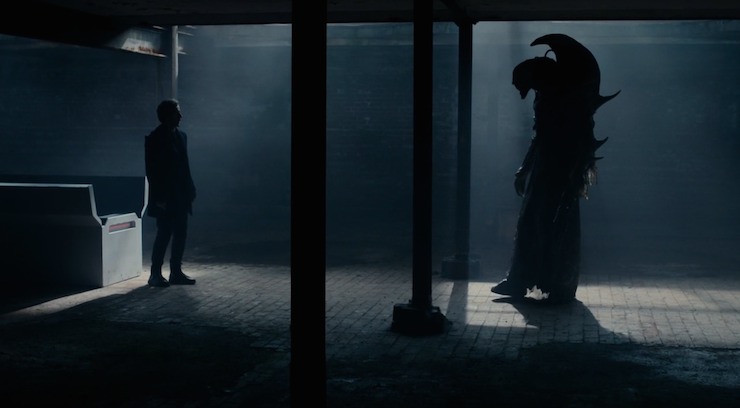
The resolution of the mystery was more enjoyable for the fact that it didn’t “cheat” much anywhere. There are good solid reasons for most of the impossible elements, and we don’t feel robbed of the fear brought about by the ghosts, even when we learn that they are electromagnetic projections—because they still are ghosts after a fashion. It’s the whole reason why the Doctor becomes so indignant on their behalf; the Fisher King is using their souls for his own gain. The explanation of why Lunn wasn’t targeted also works well within the plot, with the explanation that the words must be seen to be effective.
Cass continued to be a star character through and through, and I hope we have some occasion to encounter her again in the series. The fact that she is a character with a disability played by an actress with that same disability is so important, a template for how every television show can and should be doing the same thing. (The actor who plays Lunn has stated in an interview that he has a deaf sister, so he knew BSL before going into the role, which is likely what made their dynamic so natural onscreen.) And it’s not just seeing her there in a role of prominence and power, it’s also the fact that her disability does not get her killed, when the episode could have easily taken that cheap turn. Cass is approached by an enemy she cannot hear, but like many people in her position, she has learned to rely on other senses to guide her. She feels the ghost approach through vibrations in the floor and is allowed to save herself, rather than having Clara comes to the rescue—a more common occurrence in the Who narrative.
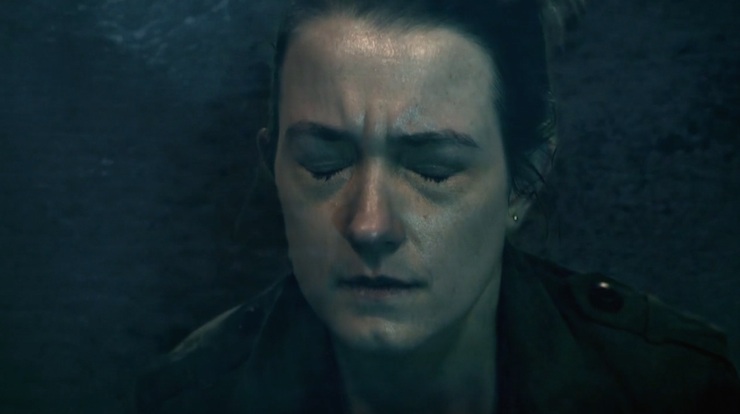
And at the heart of the episode, we have the relationship between the Doctor and Clara, still growing and changing and getting stronger by the day. But we also see the ways in which Clara’s dependency on the Doctor is already becoming a problem, made sharper for the fact that most companions go through this without coming out and saying so the way she does. Clara tells the Doctor that he’s not allowed to die while she’s his traveling buddy, that he’s given her something special, something that helps to refocus her life and make it worth living. It makes the Doctor’s warnings that everyone has to learn to face death much more ominous.
I haven’t been listing the Whovian Easter Eggs in this season thus far, but this episode had a bunch of fun ones:
- Prentis mentions that his race were conquered by the Arcateenians, who were previously mentioned a Whithouse Torchwood episode, “Greeks Bearing Gifts.”
- The aforementioned Magpie amp.
- O’Donnell mentions Harold Saxon, and companions Rose, Martha, and Amy.
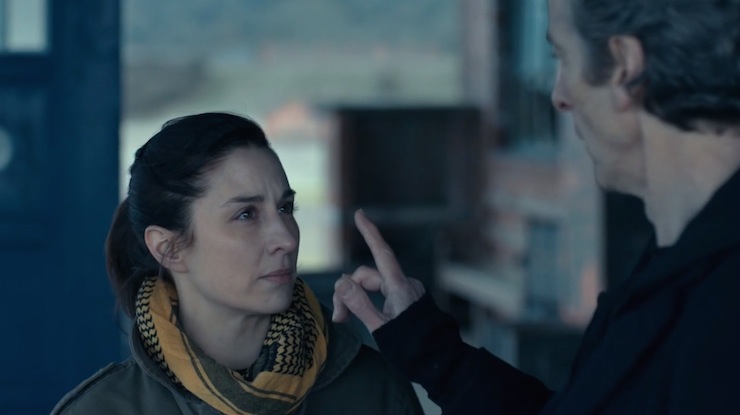
- TARDIS security protocol 712 has been used in “Blink,” and we have seen other emergency protocols in “Let’s Kill Hitler” and “The Parting of the Ways.”
- When O’Donnell asks what year they’re in, the Doctor determines this by licking his finger to better feel the wind with it, which he also did to the determine the section of the Library he and Donna landed in during “Silence in the Library” and to figure out how far away the flight deck was in “Flesh and Stone.”
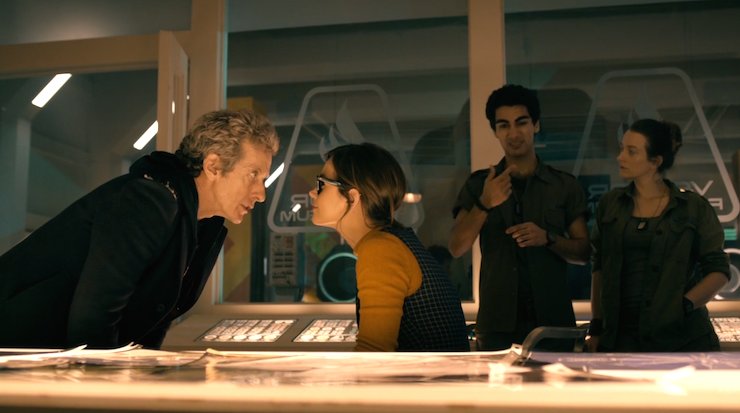
Next week: “The Girl Who Died”










